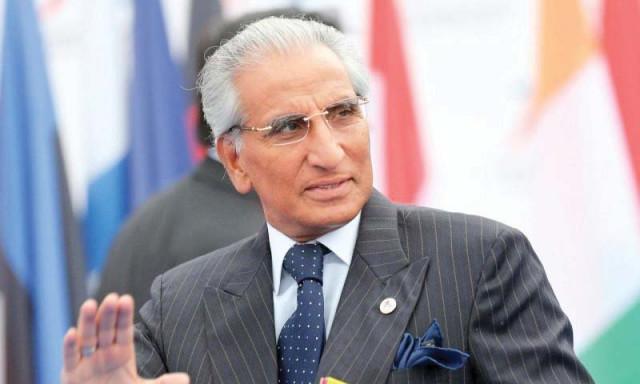PM’s top aide won Trump team pledges last year
FO has crafted a cautious approach in response to controversial executive orders by the US president

FO has crafted a cautious approach in response to controversial executive orders by the US president.
After spending over a week in the US capital, Tariq Fatemi returned home without being able to meet any senior officials of Trump’s transition team – at least that is what was reported at the time.
PM's aide, US envoy chalk out road map for meetings
It has now emerged that Fatemi quietly met at least two senior members of Trump’s transition team. Those meetings were not publicly acknowledged at the Trump administration’s request, officials familiar with the development told The Express Tribune.
In those meetings, Fatemi was assured that the new US administration would not resort to any drastic measure against Pakistan, as was being widely anticipated. He reportedly gave a detailed briefing to Trump’s transition team on the future of Pak-US ties, Islamabad’s concerns on key issues related to bilateral ties as well as regional issues.
As a result of the ‘positive outcome’ of Fatemi’s visit, the government decided in principle to adopt a more cautious approach on President Trump’s controversial executive order banning nationals from seven Muslim-majority countries from travelling to the US. While Interior Minister Chaudhry Nisar Ali Khan did issue a strong statement denouncing the ban, the official line taken by the Foreign Office was diplomatic as well as measured.
In fact, FO spokesperson Nafees Zakaria appears to have tactfully deflected criticism against Pakistan for its weak reaction to the Trump administration’s move by stating: “It is every country’s sovereign right to decide its immigration policy.”
The muffled response to Trump’s controversial moves is carefully crafted to avoid annoying the White House. Officials said the government did not want to undo the groundwork it has already laid for a ‘positive start’ as far as ties with the US are concerned.
In an interview with a private TV channel, Fatemi confirmed the meeting with certain Trump administration officials during his visit to Washington in December. He said he did not disclose this earlier at the request of Trump’s transition team. He, however, would not provide specific details, particularly regarding the officials whom he met. Contrary to the public perception, Pakistani policymakers are quite hopeful relations with the US could change for the better. Their optimism stems from the fact that some of the senior cabinet members of President Trump have had the experience of dealing with Pakistan.
One of them is Defence Secretary James Mattis, who as head of US CENTCOM frequently travelled to Pakistan and interacted with its military leadership. In his confirmation hearing before the Senate, Mattis underlined the need to remain engaged with Pakistan. He went on to say that the US would offer incentives to encourage Pakistan to cooperate with Washington on some of the pressing issues including fighting militancy.
PM Nawaz hopes to meet Trump after inauguration
One of the stumbling blocks in Pak-US ties is the longstanding suspicion in Washington that Pakistan still has a hands off approach towards certain militant outfits. Although Pakistan denied any foreign pressure, the recent detention of Jamaatud Dawa chief Hafiz Saeed, the suspected mastermind of November 2008 Mumbai attacks, was to send a message to the US that the country’s anti-terror war was not selective.
Building on these moves as well as initial contacts, Pakistan is now looking to start formal engagement with the new US administration. For this purpose, US Ambassador David Hale met Fatemi on Friday to discuss ‘prospective engagements’ between the two countries once the Trump administration settles down.
Pakistan is likely to send a high-powered delegation headed by Prime Minister’s Adviser on Foreign Affairs Sartaj Aziz in the coming months to hold talks with the Trump administration. The possibility of a visit by senior military and intelligence officials to Washington is also on the cards.
Published in The Express Tribune, February 6th, 2017.












1724319076-0/Untitled-design-(5)1724319076-0-208x130.webp)






COMMENTS
Comments are moderated and generally will be posted if they are on-topic and not abusive.
For more information, please see our Comments FAQ